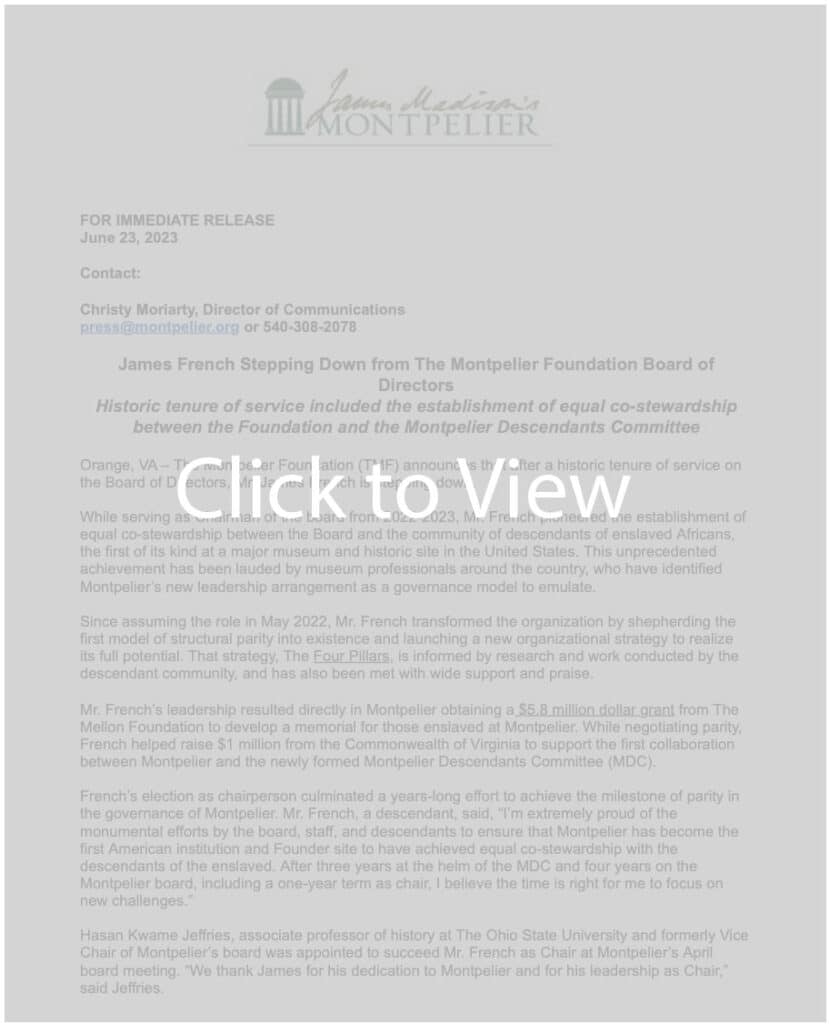Our Journey
From Exclusion to a New Standard for Excellence
In February 2018, a group of nearly fifty educators, curators, scholars, activists, museum and historic site professionals, and descendants gathered at James Madison’s Montpelier in Orange, Virginia, at the inaugural National Summit on Teaching Slavery. The Summit’s scholarly output, the Rubric of Best Practices for Descendant Engagement in the Interpretation of Slavery (the ‘Rubric’), provides a self-evaluation methodology for museums and historic sites. The paramount principle of the Rubric, Structural Parity (SP), is to share power and decision making authority equally with descendants, ensuring effective, respectful, and accurate interpretation of slavery.
June 2019 saw descendants of hundreds of Americans enslaved at Montpelier and nearby plantations convening to discuss the Rubric and their relationship with the Foundation. This meeting resulted in the establishment of an organization, the Montpelier Descendants Committee (MDC). The first organization founded upon the principles of the Rubric, the MDC sought to represent descendants’ interests with The Montpelier Foundation (TMF). James French was elected as the MDC’s founding Chair and proposed the name to evoke Madison’s service on Orange County’s Revolution-era Virginia Committee of Safety.
While the Rubric provided an important articulation of inclusivity principles, and supplied a detailed methodology for self-evaluation, it lacked a framework for implementing joint governance. French saw this an entry point to explore Montpelier’s larger “parity paradox” for clues on how to translate the aspirations of the Rubric into a new model for governance. Writing in the Washington Post on May 16, 2022, on Montpelier, French observed:
It is where two diametrically opposed visions of power have clashed for centuries: liberty and slavery. For almost a century and a half, a single family derived its wealth and prestige from the brutal extraction of forced labor of hundreds. At the same time, it is where, in the words of Madison, a revolutionary “experiment of an extended republic” was crafted in the hope that “the patriotism of the people will continue, and be a sufficient guard to their liberties.” The MDC understood that within this paradox was an opportunity to reconcile communities — local, regional, and national — that had been separated and even polarized throughout history by building an expanded common base of memorialization.
The opportunity to which French referred lay in the natural alignment between the principles of Structural Parity and Madisonian principles of representative democracy. In a museum context, this alignment provides the opportunity to develop a governance model that integrates the shared decision-making principles of SP with the foundational ideals of representative democracy. By harmonizing these principles into a new governance model, French aimed to equip Montpelier with institutional capacity, through education, to bridge historical divides, reconcile communities, and establish a broader and more inclusive foundation for memorialization spanning local, regional, and national levels.
Above: James French interviewed during the struggle for Structural Parity at Montpelier. Capehart Live. (via The Washington Post)

In his dual role as chair of the MDC and TMF board member, over four years, French spearheaded efforts to achieve SP at Montpelier, marking a historic milestone in museum governance. Navigating sustained resistance, his negotiations resulted in the seating of 11 new national board members to represent descendants, making TMF the first American institution and Founder site to share power equally at the board level.
After being elected as TMF’s Chair, becoming the first from a descendant background at any Founder site, French took immediate and decisive action. He reinstated staff members who had been dismissed for their support of parity and crafted a new strategic vision and fundraising strategy centered around four key pillars:
- Memorialization of America’s Invisible Founders,
- Enhancing the Visitor Experience by linking Montpelier’s power of place to the exploration of a broader and more complex American origin story, and its potential to promote unity,
- Expansion of the Robert H. Smith Center for the Constitution to advance democratic thought, and
- The “Arc National Trail,” envisioned by French during his tenure as chairman of the MDC and funded through a planning grant he secured from the National Trust for Historic Preservation, is a proposed recreational trail that blends history, science, and outdoor adventure. To be plotted within an area of roughly 3,400 square miles of Piedmont Virginia, the trail would connect historically significant sites, including many lesser-known communities of both enslaved and free persons of color, with many locations still awaiting archaeological exploration
Furthermore, French secured a $5.8 million grant from The Mellon Foundation to support the Memorialization pillar. Additionally, French initiated an executive search process to appoint a new CEO.
The attainment of SP at TMF represents a seminal moment in the evolution of museum governance, echoing far beyond its walls to impact cultural sites and corporate practices worldwide. French, recognized as the pioneer behind this groundbreaking initiative, concluded his tenure as TMF’s Chair in Spring 2023. Now, as the Founder/CEO of Brownland Leadership Solutions (BLS), he embarks on a new journey. BLS will forge alliances across diverse sectors, partnering with leaders in culture, technology, business, and academia to amplify and extend the benefits of the SP governance model and ignite a renaissance across institutions.

